ETp Live! 2017
On Saturday 24th June 2017, some of the best and most relevant conference speakers got together with a group of teachers/trainers at the Old Ship Hotel in Brighton for the ETp Live! conference. In such an inspirational setting, the collective noun ‘group’ just does not seem to do justice to the delegates, which is why in her opening speech, English Teaching professional editor-in-chief Helena Gomm offered the following alternatives: a conjunction of grammarians, a babble of linguists, an array of luminaries. Whichever collective noun we go with, it is without doubt that we were in the company of forward-looking visionaries with the talks of the day focusing on how we can take a step further to cater to the developing needs of our students, clients, trainees and staff in these changing times.
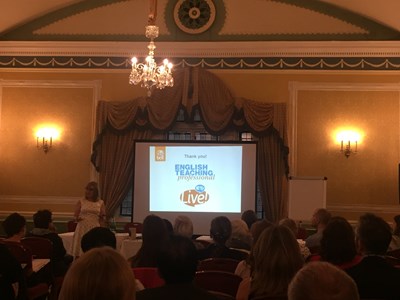
Silvana Richardson opens ETp Live! with her plenary on making learning visible.
In her opening plenary, Silvana Richardson spoke about how we as teachers could make learning visible. A lot of teaching is invisible in that students are clueless as to what success looks like. When it is clear what teachers are teaching, what students are learning and how well they are doing, students’ achievement will increase.
This means moving beyond rigid lesson outcomes or simply stating the lesson stages or activities of the day, and having a two-way conversation about learning intentions and success criteria with our students. By giving students a voice by nominating students, getting feedback from students using confidence scales or apps like Mentimeter or Padlet, teachers are better able to think of teaching with learning in its forefront.
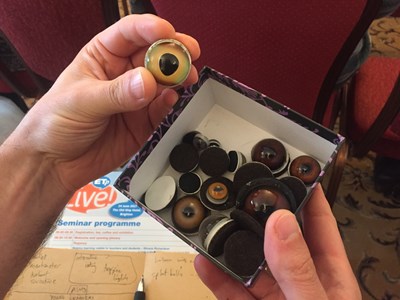
Chris Roland produces some fun props in his practical session on kinaesthetic learning.
In the first parallel session, delegates had a choice of three sessions:
A regular contributor of ETp and young learners’ teacher, Chris Roland spoilt the audience with a range of fun and engaging activities for the classroom. Whether it was throwing splat balls at the board, passing down a bag of cat litter, creating a layout of a house on the classroom floor, or matching animal eyes (which Chris had purchased from a taxidermist – see picture above) to the right animals, Chris’s kinaesthetic activities were entertaining and memorable, and could certainly be enjoyed by older students alike.
Tests and assessments often elicit a groan from both students and teachers as they tend to be seen as a hurdle for all to endure. Academic lead at Trinity College London, Alex Thorp, looked at assessment through the students’ eyes and considers how we can use assessment to help students fulfill their learning potential, developing their communicative competencies so that we need not be testing students for the sake of testing them.
In trying to cope with the changes in the marketplace, English schools have been going through multiple changes in the recent years, and it has become essential that education managers have to consider how they can manage such changes whilst improving teaching standards in their staffrooms. In his talk on new approaches to teacher development, the Director of Studies from St Giles International London, Josh Round, addressed this pertinent issue and the challenges an education manager should consider when introducing change.
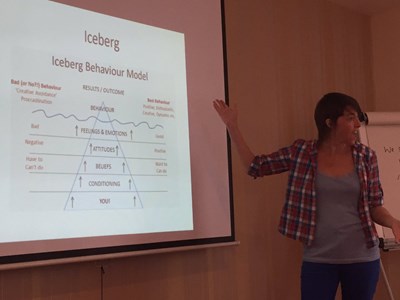
Melissa Lamb considers the tricky process of giving trainees feedback on teacher training courses.
After a delicious tea/coffee break in the exhibition area, we had our second parallel session with three more sessions to choose from:
Teacher trainers would be familiar with the very emotional experience of giving trainees feedback after they have been observed teaching. While some might see the feedback as some form of personal attack and either become teary or defensive, others might seem to agree with the feedback only to demonstrate a lack of understanding in their subsequent teaching practice sessions. In her talk, experienced CELTA and DELTA tutor, Melissa Lamb helped us to understand teacher behaviours by considering their underlying beliefs and attitudes to, and about learning, and explored a procedure that makes the feedback process more dialogic and effective. No more tears!
ELT writer and content developer Katherine Bilsborough maintains that most teachers are already material writers as they seek to adapt course materials, write their own worksheets, create their own classroom activities and help students understand complex grammar rules and new lexical items. However, many teachers do not have training in materials writing and might struggle without a framework. In her very useful talk, Katherine outlined the principles of material creation and suggested a few helpful websites that can enable writers to check the level of their materials.
It is quite common for teachers to walk into a class of advanced learners, listen to their proficient English and feel at a loss as to how they can add value to their classes. After all, they’ve covered all the grammar structures there are to be covered! International House Zurich-Baden’s Head of English, Dale Coulter looked at the different types of advanced learners and made some useful suggestions on how we can push such learners with practical ideas such as the use of WhatsApp groups and conducting real-time social media chats while watching the class’s favourite television programme.
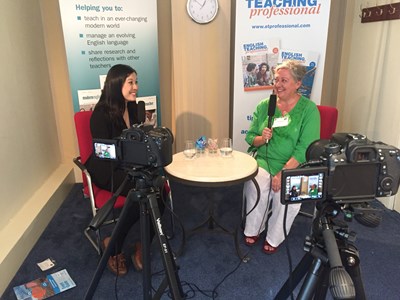
Chia Suan Chong interviewing Katherine Bilsborough on her talk.
Just before the lunch break, I conducted a short 30-minute plenary workshop on the skills of the international communicator. In a time when English is used as a tool to facilitate international communication, it has become essential for English teachers to prepare our students for interactions not only with English native speakers, but also in international, cross-cultural contexts with other users of English. We examined a couple of critical incidents designed to encourage discussion and reflection, and considered how role-plays could be used to develop the adaptation and accommodation skills of our students.
In an after-lunch plenary, educational consultant Jason Anderson echoed this point of view as he spoke about translingualism and how our learners would not be using English in a mono-lingual, mono-cultural way, but would be using English alongside their own languages and identities. It thus seems inappropriate to be banning the use of other languages in the English classroom, or to solely focus on the once-called ‘target culture’. Jason asserts that we need to prepare our students for this translingual future, honing their code-switching skills and enabling them to become flexible and fluid in their use of English.
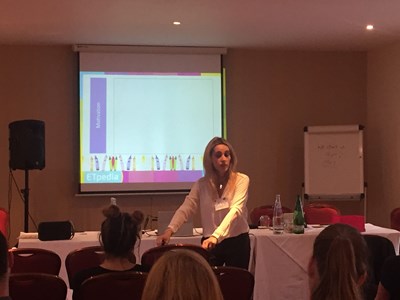
Vanessa Reis Esteves shows us how to use story-telling with young learners.
In the last parallel session, we again had three fantastic speakers to choose from:
Author of ETpedia for Young Learners, the very bubbly and charming Vanessa Reis Esteves showed us how to maximize the power of storytelling to develop our learners’ critical thinking skills by experiencing the lesson from the point of view of the learner.
Another ETp author, Danny Norrington-Davis, who has just published his best-selling book ‘From Rules to Reasons’, expanded on how we could design and adapt classroom materials so that students are not subjected to blanket grammar rules liable to multiple exceptions, but are better able to derive reasons for the use of certain structures from contexts.
In the meantime, teacher trainer and materials writer Lindsay Warwick, follows on from Silvana Richardson’s opening plenary in exploring ways to help define and negotiate the success criteria of IELTS tasks with students, enabling them to discover what is required when doing a task and to set individual targets that would help build confidence in tackling the different IELTS papers.
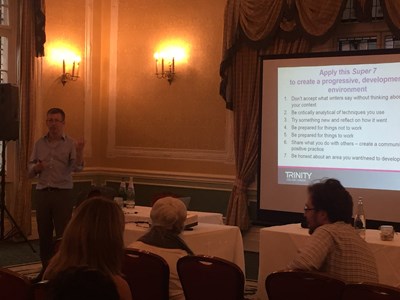
Ben Beaumont’s call to arms for teachers to engage in meaningful research.
Delegates were then able to indulge in a spread of delicious afternoon treats (including chocolate cakes, mini Victorian sponges and ultra-light cream puffs) before heading to the closing plenary – an inspirational talk by Ben Beaumont that encouraged teachers to take charge of their own work by engaging in educational research to both inform their own teaching and support their own career prospects. As Ben made references to other talks at ETp Live! 2017, he summarized what we had learnt during the short-span of this conference and showed us all how we can go forward armed with these practical ideas.
As teachers and speakers filtered out of the Old Ship Hotel in Brighton, charged with a new kind of energy, some who felt reluctant to see an end to the day proceeded to a nearby pub to continue their discussions on teaching. There’s nothing like a cosy gathering of teachers motivating, supporting and inspiring one another to greater heights, be they ‘a conjunction’, ‘a babble’ or ‘an array’!
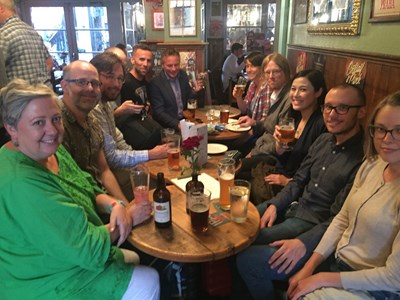
Celebrating the end to a wonderful conference!


Comments
Write a Comment
Comment Submitted